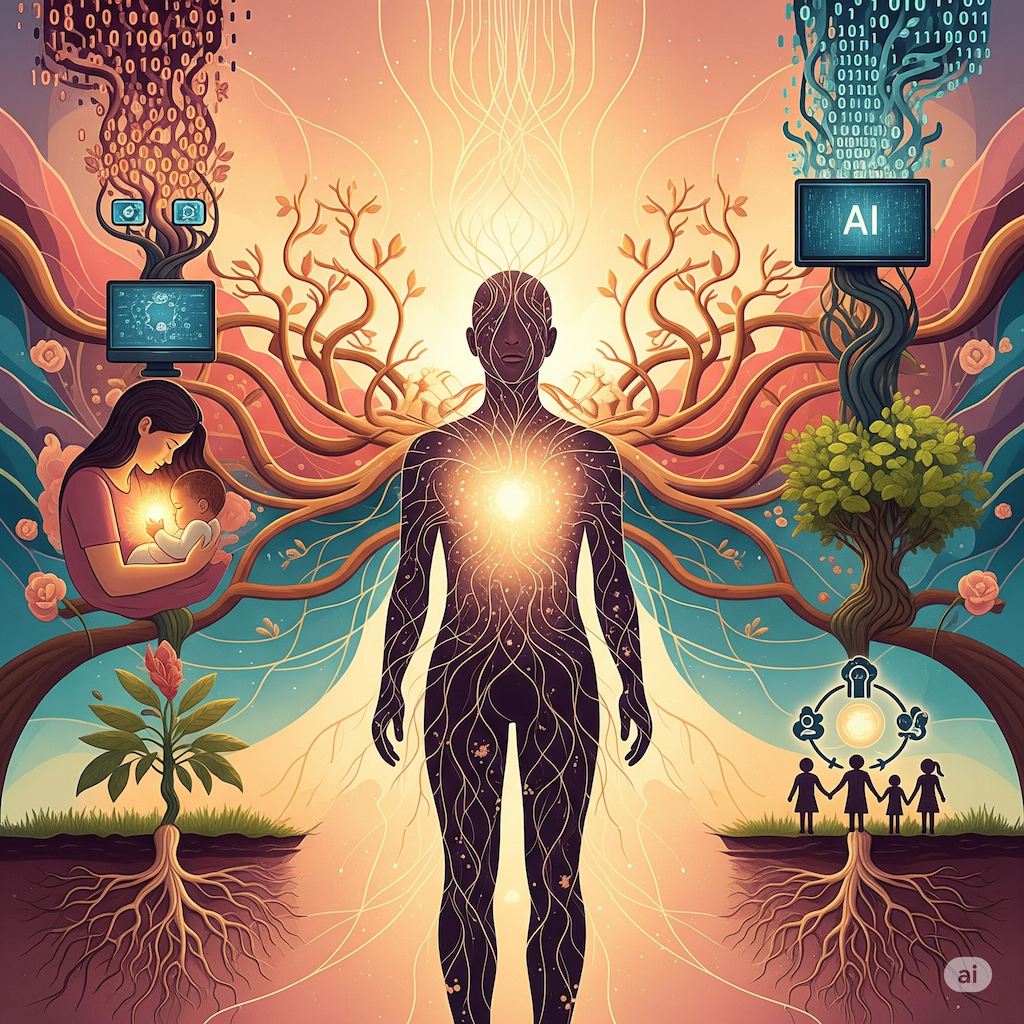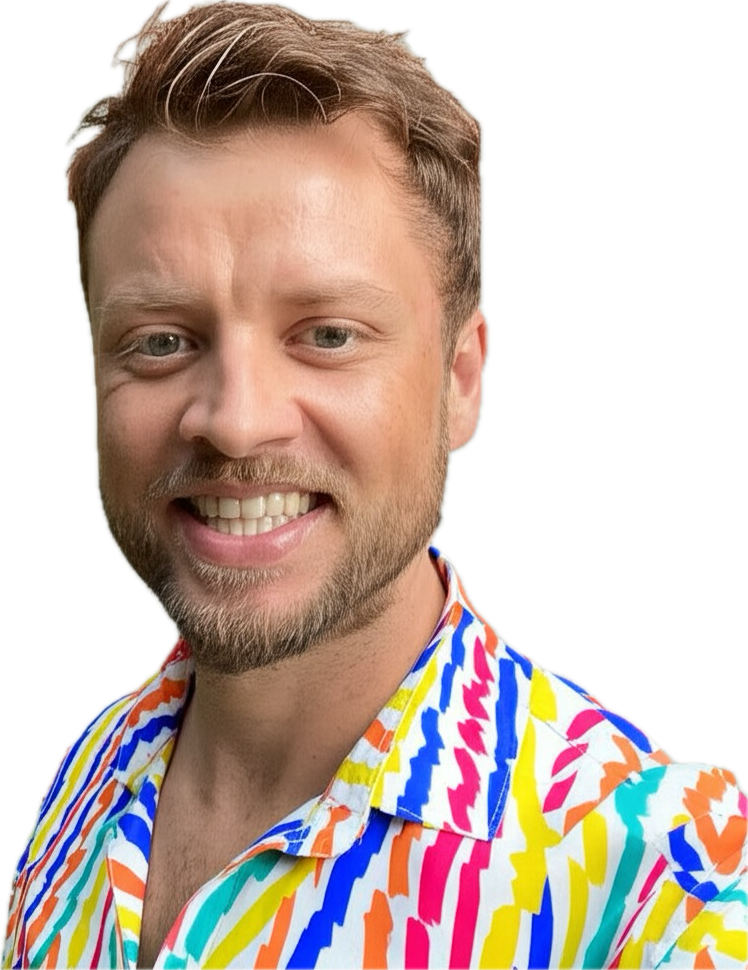
For quite some time I was heavily dependent on my mother. As a newborn, I was completely vulnerable and needed constant care and feeding—newborns can survive without feeding for several hours, but their wellbeing depends entirely on caregivers. This stark reality of human vulnerability has stayed with me, shaping how I understand our fundamental need for connection.
Codependency is a natural mechanism. From ancient amoebas and parasites to modern systems, we’re all codependent to be alive. It’s not a flaw in our design—it’s the very foundation of life itself. Every breath we take depends on plants producing oxygen. Every meal connects us to farmers, soil, and countless other beings in an intricate web of mutual support.
I’m near forty now and I still feel I’m a machine of codependencies. Every codependency is an agreement of mutual give and take from both sides. Mother releases oxytocin and endorphins during breastfeeding and bonding, while the baby’s presence and suckling triggers even more of these hormones in the mother. This isn’t transactional in a cold sense—it’s the warm, biological foundation of love itself.
The beauty of recognizing this is understanding that dependency isn’t weakness. It’s the recognition that we exist in relationship, not in isolation. Even the strongest among us are supported by invisible networks of care.
On food habits
Put some sugar, salt, oil or fat and you’ll see how it works :)
But beyond the immediate pleasure response, our relationship with food reveals deeper patterns of codependency. We depend on the earth’s generosity, on the labor of others, on supply chains that span continents. Even a simple apple carries the work of hands we’ll never shake, soil we’ll never touch, and sunshine we didn’t create.
When I eat mindfully, I feel this web of connection. It humbles me. It makes me grateful not just for the food, but for belonging to a world where such interdependence is possible. Our cravings aren’t just biochemical—they’re echoes of our deepest need to be nourished by something beyond ourselves.
On family hierarchy, inheritance and privileges
Privilege is a right nobody can take from you. You have the privilege to belong to your family. You can’t change it.
Hierarchy refers to the natural ordering that emerges in families—not necessarily about power over others, but about responsibility, protection, and the flow of resources and wisdom across generations. I’ve learned that healthy hierarchy isn’t about dominance; it’s about service. Parents serve children by providing structure and safety. Children serve the family by receiving this care openly, allowing themselves to be loved.
What I learned from my own parenthood experience with my son was that he worked as part of my self-regulation routines and helped me build better schedules and full-attention mechanisms. Focusing on him was paradoxically relaxing, freeing me from the remaining commitments that were always banging against my consciousness.
This wasn’t just about him needing me—I needed him too. His presence anchored me to what matters most. In caring for him, I found a deeper version of myself, one less scattered by the endless demands of modern life.
As we started with mother, money comes from the father in traditional models, and the resource mapping of codependencies only grows. But I’ve seen families where these roles blur beautifully, where both parents nurture and provide in their own ways. What remains constant is the flow—love, attention, resources, time—moving through the family system like blood through a body.
The inheritance we leave isn’t just material. It’s emotional patterns, ways of being, unhealed wounds and hard-won wisdom. Being conscious of this inheritance—what we received and what we pass on—is perhaps our greatest responsibility.
On software development
Now with AI we’re empowering our codependency with co-pilots, leveraging LLMs and exchanging exciting fast results with our time and expanded cognitive power.
But this relationship with AI mirrors deeper patterns in how we’ve always worked. I’ve never written code in isolation—I depend on libraries built by strangers, documentation written by generous souls, Stack Overflow answers from patient teachers I’ll never meet. Open source is codependency made visible.
What strikes me about AI pair programming is how it makes explicit what was always true: creation is collaborative. Even when I thought I was coding alone, I was in conversation with generations of programmers who came before me. Their ideas lived in the patterns I learned, the paradigms I inherited.
The question isn’t whether to depend on AI, but how to do so mindfully. Just as with any relationship, the key is maintaining agency while embracing support. AI can amplify my capabilities, but it cannot replace my judgment, my creativity, my responsibility for the consequences of what we build together.
I’ve written before about how programming itself has become a kind of addiction, and AI has only intensified this dependency. The 5x productivity boost comes with its own form of codependency—we become reliant on these tools not just for efficiency, but for the dopamine hits of rapid problem-solving.
On life relationships
My personal preference is to not have too many friends or live with too large a number of people. I like public speaking and well-oriented conferences where we talk to those who want the topic. For partnership, it’s different. We’re supportive listeners for life, and to live together we need to embrace camaraderie and compassion.
The quality of presence I can offer diminishes when spread too thin. I’ve learned to honor this about myself rather than fight it. Some people are rivers—they can nurture many connections with their flowing energy. Others are wells—they offer deep, quiet sustenance to fewer people. Neither is better; both are needed.
In my closest relationships, the snowball of codependencies becomes beautifully complex. My partner depends on me for certain kinds of emotional support; I depend on her for others. We’ve learned to map these needs openly, to celebrate rather than hide our mutual reliance.
True intimacy, I’ve discovered, isn’t independence maintained while sharing space. It’s the conscious choice to interweave lives, to let another person’s wellbeing become inseparable from your own. This requires tremendous trust—the faith that the other person will handle your dependence on them with care.
When I look at couples who’ve been together for decades, I see this beautiful interdependence—not the desperate clinging of insecurity, but the relaxed confidence of knowing you’re held by someone who chooses to hold you, day after day.
On community and belonging
Beyond family and partnership, there’s the wider web of community. I’ve noticed how modern life often tries to sell us independence as the highest virtue. But indigenous cultures understood what we’re rediscovering: that individual thriving and community wellbeing are inseparable.
When my neighbors flourish, my neighborhood becomes more beautiful. When my colleagues grow, our shared work improves. When strangers on the internet share their knowledge freely, we all become more capable.
I’ve reflected on this in my work with tech communities—how serving your community creates ripple effects that benefit everyone. The invitation is to move from unconscious dependence to conscious interdependence—to choose our connections with awareness and tend them with care.
Conclusion
There’s no good or bad here, it’s about being conscious about it. It’s about remembering your values and your resources, your expectations of give and take.
The goal isn’t to eliminate dependence—that’s impossible and undesirable. The goal is to understand the dance, to see the beautiful complexity of how we hold each other up. Some dependencies nourish us; others drain us. Some are temporary; others span lifetimes. All deserve our attention.
What I’m learning is that the healthiest dependencies are conscious ones—where both parties understand what they’re giving and receiving, where there’s room for growth and change, where love flows not from neediness but from appreciation for the miracle of being supported and being able to support others.
In the end, codependency isn’t something to overcome. It’s something to honor, to navigate with wisdom, and to celebrate as the fundamental truth of what it means to be alive in relationship with the world.
We are not separate. We never were. And in embracing this truth with both vulnerability and strength, we find not just survival but the possibility of genuine flourishing—together.
